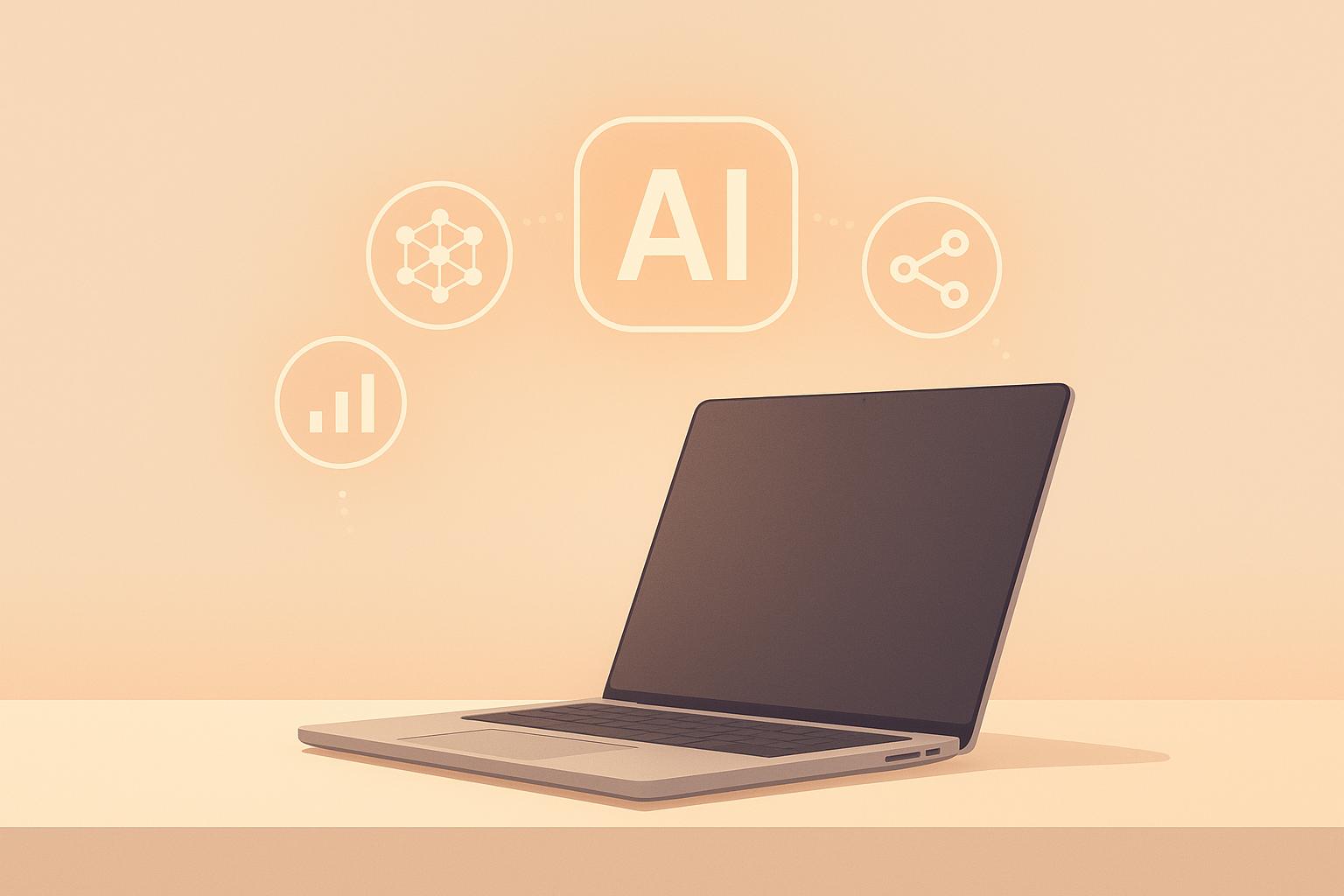AI job matching is transforming how people find jobs and hire talent in local markets. It connects job seekers with roles that match their skills, experience, and location preferences while helping employers find qualified candidates faster. Here's what you need to know:
- How It Works: AI systems analyze resumes and job postings to recommend the best matches based on skills, experience, and regional factors.
- Local Market Focus: These tools adapt to regional needs, like language preferences, salary expectations, and labor laws.
- Key Benefits:
- Saves time by narrowing down relevant opportunities.
- Improves match quality for both candidates and employers.
- Protects users from fake job postings.
- Offers actionable insights like salary trends and in-demand skills.
- Main Features:
- Smart job suggestions tailored to your profile.
- Market data analysis for salary, skills demand, and application success.
- Legal compliance and scam detection for safer job searches.
AI platforms like JobSwift.AI are leading the way by combining advanced technology with local insights to simplify and improve the job search process for everyone.
Podcast #140: Connecting Local Workers to Opportunities ...
Main Features of AI Job Matching
AI job matching systems use advanced algorithms to connect candidates with local opportunities, making the job search process smoother and more efficient.
Smart Job Suggestions
These systems analyze your profile to recommend jobs that align with your:
- Experience and skills
- Location preferences
- Salary expectations
- Career goals
- Certifications
For example, JobSwift.AI learns from how users interact with the platform, refining its recommendations to provide better matches over time.
Skills and Company Match
Beyond job suggestions, the system evaluates how well candidates align with specific roles by considering:
- Technical and soft skills
- Relevant experience
- Industry knowledge
- Certifications
- Indicators of workplace compatibility
This ensures recommendations aren't just based on qualifications but also on how well a candidate might fit within a company's culture.
Market Data Analysis
To tackle local job market challenges, the system uses market data to guide candidates on salary expectations, in-demand skills, and effective application strategies. Here’s what it offers:
1. Salary Analysis
The platform reviews local salary data, helping candidates understand what fair compensation looks like in their area.
2. Skills Demand Tracking
It pinpoints trending skills and certifications that employers in specific regions are prioritizing.
3. Application Success Metrics
Users gain insights into response rates and the best times to apply for jobs, improving their chances of success.
| Market Data Feature | Benefit to Job Seekers |
|---|---|
| Salary Analysis | Know what to expect for compensation |
| Skills Demand | Focus on skills and certifications that matter |
| Success Metrics | Apply at the right time for better results |
| Industry Trends | Discover sectors with growth potential |
| Regional Insights | Zero in on opportunities nearby |
Local Market Customization
Tailoring AI job matching to fit regional language, legal, and cultural standards ensures relevance and accuracy.
Language Support
AI platforms process job postings and candidate profiles in various languages, adapting to regional communication styles. They account for:
- Industry-specific terminology: For instance, recognizing that "software engineer" can also mean "developer" or "programmer."
- Automatic qualification mapping: Identifying and validating equivalent credentials across different regions.
- Local communication preferences: Adjusting to the business culture of a specific area.
This goes beyond just language - it ensures compliance with regional legal standards for job matching.
Legal Requirements
AI systems ensure job postings meet local labor laws and adhere to strict data privacy rules specific to each region. Important factors include:
- Compliance with minimum wage laws
- Restrictions on working hours
- Requirements for employee benefits
- Anti-discrimination guidelines
- Adherence to California Consumer Privacy Act (CCPA) for California residents
- Protocols for handling state-specific data privacy
Local Job Trends
AI platforms also incorporate insights from regional employment trends to provide more targeted job recommendations. This involves:
- Monitoring industry growth in specific locations
- Identifying local demand for new and evolving skills
- Comparing current compensation data within the region
- Tracking shifts in preferences for full-time, contract, or remote work opportunities
sbb-itb-96bfd48
Advantages of AI Job Matching
AI job matching refines the job search process by combining local market knowledge with faster results and detailed insights. It simplifies finding jobs while adhering to regional standards and preferences.
Speed and Match Quality
AI tools quickly process large amounts of job data to find matches that align with:
- Skills: How well your abilities fit the job requirements
- Experience: Matching your career level to the role
- Location: Your geographic preferences
- Salary: Your expected pay range
- Industry: Specific qualifications relevant to your field
Platforms like JobSwift.AI also provide real-time dashboards that explain why certain roles are recommended, making the process clearer and more user-friendly.
Reducing Bias
AI job matching focuses purely on qualifications and skills, removing human bias from the initial screening process. This approach ensures:
- Fair evaluations based on merit
- Consistent criteria for all applicants
- Focus on relevant factors, like skills and experience
- Equal opportunities for qualified candidates
By applying objective standards, AI helps create a fairer hiring process and reduces unconscious biases during early screening. It also uses market data to give users a competitive edge.
Market Insights
AI platforms analyze local job markets to provide actionable insights, helping job seekers make informed decisions. These insights include:
| Market Aspect | What It Offers |
|---|---|
| Salary Trends | Updates on pay changes in your area |
| Skill Demand | New qualifications and certifications |
| Industry Growth | Expanding or shrinking sectors by region |
| Work Arrangements | Trends in employment types (e.g., remote) |
Additionally, AI tools can highlight hiring trends, required qualifications, competitive pay ranges, and common benefits in specific industries. This data helps job seekers plan their careers and negotiate offers with confidence, using accurate and up-to-date local market information.
What's Next for AI Job Matching
New AI Technologies
AI job matching is advancing with tools designed to improve application processes and boost candidate success. One major area of focus is CV optimization tools that align with Automated Tracking Systems (ATS). These tools help candidates refine their qualifications without resorting to artificial or misleading content.
An example of this progress is JobSwift.AI, which uses AI to shield users from fraudulent job postings while simplifying the application process. Its automated tracking system keeps detailed records of applications and prioritizes safeguarding personal data.
Human and AI Collaboration
The growing capabilities of AI are being paired with human oversight to create a balanced approach. Here's how this partnership works:
| Area | AI's Role | Human's Role |
|---|---|---|
| CV Optimization | Identifies ATS requirements and suggests edits | Ensures edits align with the candidate's real experience |
| Application Tracking | Collects and organizes application data | Chooses which opportunities to pursue |
| Fraud Detection | Flags suspicious postings or patterns | Confirms the legitimacy of flagged jobs |
| Market Analysis | Processes large-scale job market data | Uses insights for career decisions and planning |
"JobSwift.AI has made my job search so much easier. I highly recommend it!" - Isaiah Summers
Job Market Changes
As AI continues to evolve, the job market is undergoing changes that require these systems to stay ahead. Platforms are integrating features like:
- Advanced algorithms to detect scams
- Enhanced tools for ATS compatibility
- Secure systems for tracking applications
- Real-time job market insights
These updates aim to make the job search safer and more efficient. By focusing on security and accuracy, AI platforms are getting better at connecting candidates with legitimate opportunities while maintaining trust and reliability in local job markets.
Summary
AI-powered job matching systems are reshaping how people search for jobs locally. By addressing regional challenges and improving efficiency, these platforms are changing the dynamics of local job markets. They combine advanced technology with location-specific features to deliver more precise results.
Here’s how AI is influencing local job markets:
| Area | Impact | Benefit |
|---|---|---|
| Application Process | Automated tracking and management | Better visibility into application status |
| CV Optimization | ATS-friendly formatting | Improved alignment for screening success |
| Security | Real-time scam detection | Protection from fraudulent job postings |
| Market Analysis | Identification of local trends | Smarter, more informed career decisions |
JobSwift.AI exemplifies this approach by offering features tailored to specific markets, with both free and premium options. Their system focuses on delivering job matches that align with regional needs.
Looking ahead, the future of AI in localized job matching will depend on advancements in:
- Smarter screening that aligns with local hiring practices
- Automated tracking systems that prioritize data privacy
- Enhanced tools to combat sophisticated job scams
AI platforms are becoming indispensable for navigating the complexities of local job searches. They not only save time but also provide insights that empower job seekers to make better career choices. This integration of AI into local job markets is making the job search process more efficient, secure, and effective for both candidates and employers.


